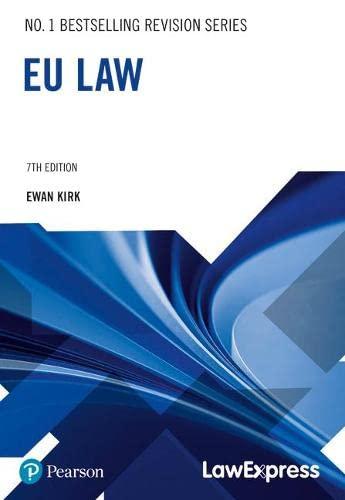Answered step by step
Verified Expert Solution
Question
1 Approved Answer
IMA102 - Midterm Topics List IMA102 - Midterm Topics List Identify the six fundamental principles administrative law General government records and information that can be
IMA102 - Midterm Topics List
IMA102 - Midterm Topics List
- Identify the six fundamental principles administrative law
- General government records and information that can be accessed under freedom of information and protection of privacy statutes -
- Inquisitorial procedure & Information and Privacy Commissioner
- Difference between a hearing and alternative dispute resolution -
- Vague laws and the principles of fundamental justice -
- Procedural fairness
- Information and Privacy Commissioner
- Challenging the decision
- Whether the criminal code is considered quasi-constitutional
- Direct evidence put before a tribunal
- The purpose and responsibility of tribunal counsel
- Canadian Bill of Rights
- The definition and purpose of a summons
- The result when a statute or regulation set out more specific fairness than a common law
- Binder that contains cases, statutory provisions, and excerpts from legal texts
- What is the substantive difference between tribunals and courts
- Unit of executive branch of government that administers laws and programs relating to particular subject area
- Canadian Law that sets out the fundamental freedoms and equality rights
- What is the difference between tribunal members and judges
- The development of administrative law to regulate the executive branch and how it carries out its functions
- What should can an adjudicator do when dealing with an uncooperative unrepresented party
- What is the indication that a tribunal has leeway to follow an inquisitorial process
- Ontario legislation that sets out the general fairness requirements for agencies and tribunals
- The process whereby superior courts review administrative decisions
- What are the cons of an agency that performs multiple functions
- Statute that specifies tribunals to provide written reasons for its decisions only when a party request
- What is the purpose of adequate notice of a hearing
- Pillars of procedural fairness
- What are the 3 familiar skills an advocate should have when appearing before a tribunal
- The purpose of rule of law
- "hybrid bodies" and the controversial nature of tribunals in our system of government
- Closing argument at a tribunal hearing
- Four characteristics for evidence to be inadmissible
- What are the 3 ways in which independence protects appointed judges
- How do tribunals and courts differ in style
- Civil servants and political pressure
- Subdelegation
- What happens when the provincial government wants to pass a criminal law
- What are the 3 kinds of issues that are in dispute and must be answered but the tribunal in its decision-making process
- Name and briefly describe the six components of the right to be heard
Step by Step Solution
There are 3 Steps involved in it
Step: 1

Get Instant Access to Expert-Tailored Solutions
See step-by-step solutions with expert insights and AI powered tools for academic success
Step: 2

Step: 3

Ace Your Homework with AI
Get the answers you need in no time with our AI-driven, step-by-step assistance
Get Started


